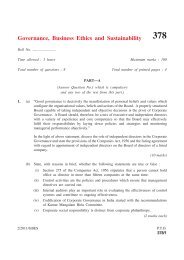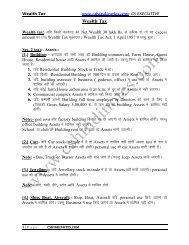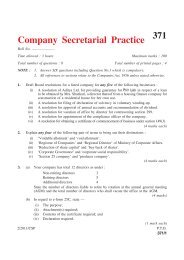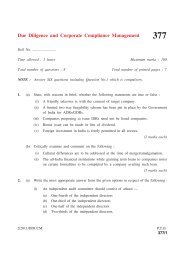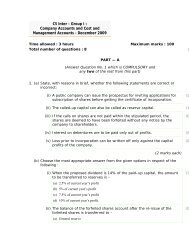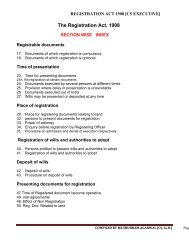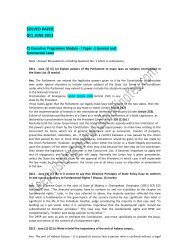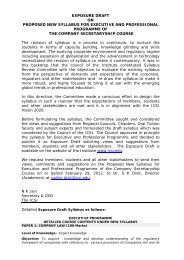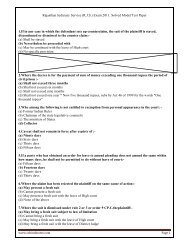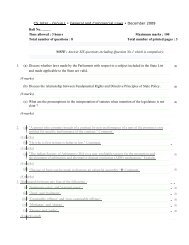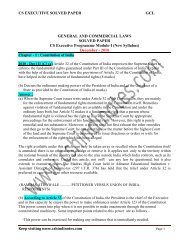Audit Committee's role and responsibility expanded - cs notes
Audit Committee's role and responsibility expanded - cs notes
Audit Committee's role and responsibility expanded - cs notes
You also want an ePaper? Increase the reach of your titles
YUMPU automatically turns print PDFs into web optimized ePapers that Google loves.
ICI India Limited<br />
<strong>Audit</strong> Committee - Terms of Reference<br />
1 Name/Purpose<br />
The Committee shall be named <strong>Audit</strong> Committee <strong>and</strong> shall assist the Board in the<br />
effective discharge of its responsibilities for corporate governance, financial<br />
reporting <strong>and</strong> corporate control. In the discharge of its functions, the Committee<br />
shall exercise the powers <strong>and</strong> responsibilities vested on it under the Companies<br />
Act, 1956, or any re-enactment thereof <strong>and</strong> the relevant clauses of the Letter of<br />
Assurances with Stock Exchanges. The Board will continue to have the overall<br />
<strong>responsibility</strong> in respect of all such matters.<br />
2 Organisation<br />
(i) The audit committee shall have a minimum three directors as members. Twothirds<br />
of the members of audit committee shall be independent directors.<br />
(ii) All members of audit committee shall be financially literate <strong>and</strong> at least one<br />
member shall have accounting or related financial management expertise.<br />
(iii) The Chairman of the <strong>Audit</strong> Committee shall be an independent director;<br />
(iv) The Chairman of the <strong>Audit</strong> Committee shall be present at Annual General<br />
Meeting to answer shareholder queries;<br />
(v) The audit committee may invite such of the executives, as it considers<br />
appropriate (<strong>and</strong> particularly the head of the finance function) to be present at<br />
the meetings of the committee, but on occasions it may also meet without the<br />
presence of any executives of the company. The finance director, head of<br />
internal audit <strong>and</strong> a representative of the statutory auditor may be present as<br />
invitees for the meetings of the audit committee;<br />
(vi) The Company Secretary shall act as the secretary to the committee.<br />
3 Meetings<br />
a) The audit committee should meet at least four times in a year <strong>and</strong> not more<br />
than four months shall elapse between two meetings. The quorum shall be<br />
either two members or one third of the members of the <strong>Audit</strong> Committee<br />
whichever is greater, but there should be a minimum of two independent<br />
members present.<br />
b) Formal notice of the Committee’s meetings shall not be necessary but the<br />
Chairman will ensure that all members <strong>and</strong> invitees authorized by the
Committee or the Board are advised of the date/ time <strong>and</strong> venue of the<br />
meetings in advance.<br />
c) The <strong>Audit</strong>ors, internal auditor if any <strong>and</strong> the Director responsible for Finance<br />
shall attend <strong>and</strong> participate at meetings of the <strong>Audit</strong> Committee but shall not<br />
have right to vote.<br />
4 Powers<br />
5. Role<br />
The <strong>Audit</strong> Committee shall have the following powers;<br />
a. To investigate any matter within its terms of reference or in relation to the<br />
compliance with the provisions of the Companies Act, 1956 or referred to<br />
it by the Board<br />
b. To seek information from any employee.<br />
c. To obtain outside legal or other professional advice.<br />
d. To secure attendance of outsiders with relevant expertise, if it considers<br />
necessary.<br />
The <strong>role</strong> of the <strong>Audit</strong> Committee shall include the following:<br />
(i)<br />
(ii)<br />
(iii)<br />
(iv)<br />
Oversight of the company's financial reporting process <strong>and</strong> the disclosure<br />
of its financial information to ensure that the financial statement is correct,<br />
sufficient <strong>and</strong> credible.<br />
Recommending to the Board, the appointment, re-appointment <strong>and</strong>, if<br />
required, the replacement or removal of the statutory auditor <strong>and</strong> the<br />
fixation of audit fees.<br />
Approval of payment to statutory auditors for any other services rendered<br />
by the statutory auditors.<br />
Review with the management, of the annual financial statements before<br />
submission to the board for approval, with particular reference to:<br />
a. Matters required to be included in the Director's Responsibility<br />
Statement forming part of the Board's report in terms of relevant<br />
provisions of the Companies Act, 1956 or any re-enactment thereof;<br />
b. Changes, if any, in accounting policies <strong>and</strong> practices <strong>and</strong> reasons for<br />
the same;<br />
c. Major accounting entries involving estimates based on the exercise<br />
of judgment by management;<br />
d. Significant adjustments made in the financial statements arising out<br />
of audit findings;<br />
e. Compliance with listing <strong>and</strong> other legal requirements relating to<br />
financial statements;<br />
f. Disclosure of any related party transactions;<br />
g. Qualifications in the draft audit report.
(v) Review with the management, of the quarterly financial statements before<br />
submission to the board for approval<br />
(vi) Review with the management, of the performance of statutory <strong>and</strong> internal<br />
auditors, adequacy of the internal control systems.<br />
(vii) Review of the adequacy of internal audit function, if any, including the<br />
structure of the internal audit department, staffing <strong>and</strong> seniority of the<br />
official heading the department, reporting structure coverage <strong>and</strong><br />
frequency of internal audit.<br />
(viii) Discussion with internal auditors any significant findings <strong>and</strong> follow up<br />
there on.<br />
(ix) Review of the findings of any internal investigations by the internal<br />
auditors into matters where there is suspected fraud or irregularity or a<br />
failure of internal control systems of a material nature <strong>and</strong> reporting the<br />
matter to the board.<br />
(x) Discussion with statutory auditors before the audit commences, about the<br />
nature <strong>and</strong> scope of audit as well as post-audit discussion to ascertain any<br />
area of concern.<br />
(xi) To look into the reasons for substantial defaults in the payment to the<br />
depositors, debenture holders, shareholders (in case of non payment of<br />
declared dividends) <strong>and</strong> creditors.<br />
(xii) Review of the functioning of the Whistle Blower mechanism.<br />
(xiii) Carrying out any other function as may be assigned to the Committee by<br />
the Board from time to time.<br />
(xiv)<br />
Review of information relating to:<br />
a) Management discussion <strong>and</strong> analysis of financial condition <strong>and</strong><br />
results of operations;<br />
b) Statement of significant related party transactions, submitted by<br />
management;<br />
c) Management letters / letters of internal control weaknesses issued by<br />
the statutory auditors;<br />
d) Internal audit reports relating to internal control weaknesses; <strong>and</strong><br />
e) The appointment, removal <strong>and</strong> terms of remuneration of the Chief<br />
internal auditor.


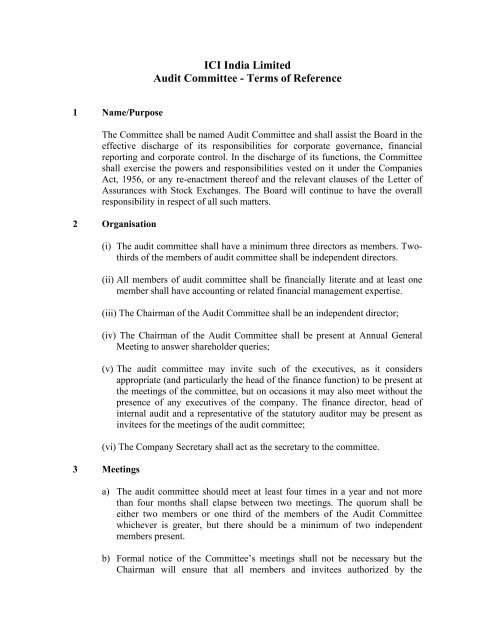
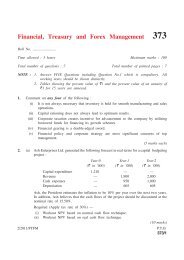
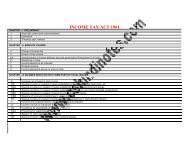
![vf/kfu;e dk vFkZ 'fu.kZ;' [ Interpretation of Statues ] Statue ... - cs notes](https://img.yumpu.com/38855798/1/190x245/vf-kfue-dk-vfkz-fukz-interpretation-of-statues-statue-cs-notes.jpg?quality=85)
